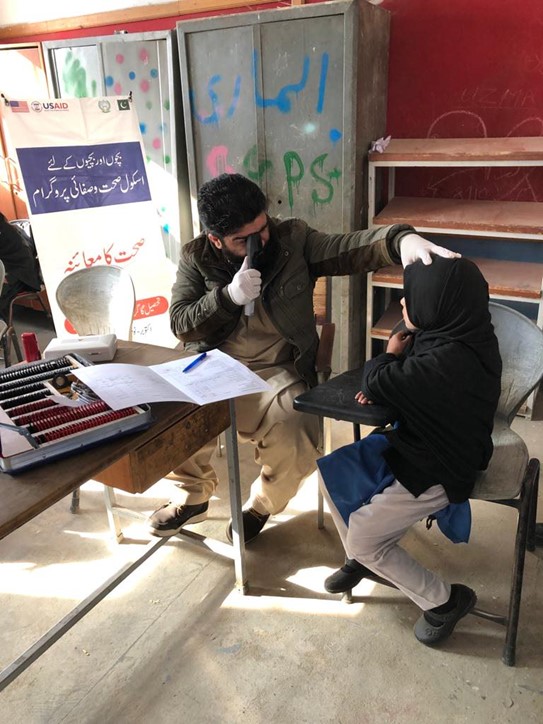

Date: Apr 24, 2023
Focus on child
health is a very important component of the HDF Education & Literacy and Health
& Wellness program. Human
Development Foundation – HDF has been successfully running a large-scale
student-centered School Health Program since its inception, a key component of
which caters to children, especially adolescent girls. Under the auspices of the U.S. Agency for International Development – USAID’s New Partnerships Initiative
(NPI EXPAND), HDF instigated a Human Development
Activity (HDA) to improve health, hygiene, and nutrition among the
25,000 school children and adolescent girls in Buner district, Khyber
Pakhtunkhwa (KP) province through implementing a school health program.
Heath, Hygiene & Nutrition Screenings of Children
HDF has
conducted health screenings of more than 9000 children so far, 49.9% of which
are girls, in 36 public schools. The project aims to put a special focus on
girls by screening 10,000 female students enrolled in all the 74 girls’
primary, middle, high and higher secondary schools in Ghagra tehsil, Buner
district. Apart from screening for acute malnourishment, general physical
examinations of these children are also being conducted to exclude any cardiac
problems, mental health issues, and any other illness. Additionally, more than
200 students have been identified with sight error and provided with
free-of-cost spectacles during hearing and vision checks being performed while
screening. We are also conducting personal hygiene sessions and providing these
children with iron/IFA supplements and multivitamins to improve their immunity
and protect them from chronic illnesses. Furthermore, the health teams are
administering deworming of all children aged between 5-15 years in coordination
with the KP Health Department. So far, 4 students have been referred for
hearing aids to the Pakistan Institute of Rehabilitation Sciences (PIRS), while 2
students were identified for eye surgeries during the screening and were
referred to the district headquarters hospital.
Teachers’ Training
HDF also trained 300 public school teachers, 49% of which are females,
as master trainers to conduct health & hygiene sessions in their schools for sustainability beyond the life of the project. The teacher training module that HDF adapted was based on the WHO
Guidelines for School Health Services 2021, and National Commission for Human
Development (NCHD), and UNICEF guidance on menstrual health and hygiene, 2019.
The training included; Health education of school children on personal hygiene, and nutrition; Adolescent health and hygiene including menstrual hygiene
management; Introduction to child health problems; Prevention of anemia
including deworming; Prevention and treatment of malnourishment; Basic health
screening techniques that can be used by non-technical staff for vision testing
and detection of hearing impairment.
AGAH Campaign on Menstrual Hygiene Management (MHM)
HDF is also
focusing on promoting adolescent health, especially awareness on Menstrual
Hygiene Management (MHM), through organizing AGAH (Adolescent Girls Awareness
on Health) behaviour change communication campaign to
encourage personal health and menstrual hygiene management.
The stigmas and
taboos linked with menstruation lead to a culture of silence on the topic
resulting in limited information on Menstrual Hygiene Management (MHM) for
adolescents, affecting girls’ health and education, and their social lives. It
also leads to school dropouts and poor attendance. The campaign title, ‘AGAH’,
is inspired from the Urdu word (آگاه) meaning ‘awareness’. AGAH is designed as
a behavior change communication (BCC) campaign for this project to promote
awareness on MHM through radio, 2D animated videos, and interpersonal
communication. HDF is conducting this campaign in all 74 primary, middle,
secondary, higher, and higher secondary girl’s schools and will reach 3,700
adolescent girls. HDF plans to reach the total population of district Buner,
which is 895,460, (Census 2017) through radio messages during the AGAH campaign
including 449,555 females, 445,872 males, and 33 transgender people.
The improved knowledge of the community on health hygiene and MHM will provide an enabling environment for the children to adopt and continue these best practices. The project aims to support the Government of KP by increasing the availability and use of quality education, health, and family planning services